|
|
|
Sort Order |
|
|
|
Items / Page
|
|
|
|
|
|
|
| Srl | Item |
| 1 |
ID:
088909


|
|
|
|
|
| Publication |
2009.
|
| Summary/Abstract |
Public diplomacy has become a critical component in grand strategy, particularly where the use of force by a state engages the attention of foreign audiences. 'Propaganda wars' now accompany, if not dominate, military moves on the battlefield, as rival states - and non-state actors - compete for the support of world public opinion. But whereas the military aspects of armed conflicts have been closely studied, their rhetorical side is only now beginning to attract the attention it deserves. This article seeks to advance the study of public diplomacy and propaganda wars by proposing a perspective that is based on the sociological and social-psychological theories of self-presentation and impression management. The assumption of a social and normative context renders meaningful the public accounts of conduct that states offer, while conceptualizing states as engaged in competitive self-presentation acknowledges the role of strategic considerations in shaping the message. The theoretical discussion develops the connection between rhetorical strategies and image-related predicaments in foreign public opinion. This is then applied to the analysis of a notable recent case - Israeli public diplomacy in the 2006 Lebanon war.
|
|
|
|
|
|
|
|
|
|
|
|
|
|
|
|
| 2 |
ID:
170017
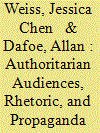

|
|
|
|
|
| Summary/Abstract |
How do government rhetoric and propaganda affect mass reactions in international crises? Using two scenario-based survey experiments in China, one hypothetical and one that selectively reminds respondents of recent events, we assess how government statements and propaganda impact Chinese citizens’ approval of their government's performance in its territorial and maritime disputes. We find evidence that citizens disapprove more of inaction after explicit threats to use force, suggesting that leaders can face public opinion costs akin to audience costs in an authoritarian setting. However, we also find evidence that citizens approve of bluster—vague and ultimately empty threats—suggesting that talking tough can provide benefits, even in the absence of tough action. In addition, narratives that invoke future success to justify present restraint increase approval, along with frames that emphasize a shared history of injustice at the hands of foreign powers.
|
|
|
|
|
|
|
|
|
|
|
|
|
|
|
|
| 3 |
ID:
189928


|
|
|
|
|
| Summary/Abstract |
Research suggests that marginalized groups can use military service to win greater governmental and social acceptance by using civic republican rhetoric, however, conditions in which claims-making rhetoric is coercive are underspecified. Because rhetorical effectiveness requires sympathetic ears, we examine the influence of (1) expectations and political efforts of marginalized group members seeking greater acceptance, (2) whether majority group economic status is outpacing marginalized groups seeking improved treatment, and (3) whether marginalized groups have influential military veterans from majority groups as allies. We apply these factors to explain the claims-making failure of German Jews following the First World War and the success of African Americans after the Second World War. From the African American case, we also conclude that military service led to greater socio-political inclusion and rights based on development of future political actors through leadership development processes and inter-group contact, especially regarding Presidents Truman and Eisenhower.
|
|
|
|
|
|
|
|
|
|
|
|
|
|
|
|
| 4 |
ID:
166363
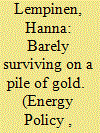

|
|
|
|
|
| Summary/Abstract |
While the share of peat in Finland's energy mix today amounts to only around 4%, peat recurrently returns to the center stage in Finnish energy-related public debates. As an indigenous energy resource, peat is a welcome addition to the energy mix of the heavily energy-dependent country. In addition, the employment impacts of peat production are considered significant. These benefits are, however, contradicted by the environmental impacts and climate emissions caused by peat energy. The conflicting interests revolving around peat have resulted in constantly shifting national peat policies as well as infrequent “explosions” of public and political debates on peat production. This article explores two of the most recent politicizations of peat through an empirical focus on the short-lived promotion campaigns that sparked widespread public debate: the 2010 “2 prosenttia” [2%] internet campaign from the state-majority-owned energy company VAPO and the 2017 “Turveinfo” [peat info] campaign launched by The Bioenergy Association of Finland. Through an analysis of the colorful and provocative promotion campaigns, this article (1) explores the arguments and rhetoric through which political support of peat is being acquired from the Finnish public and (2) examines what crises in the 2010s Finland peat is constructed as the (only) logical answer for.
|
|
|
|
|
|
|
|
|
|
|
|
|
|
|
|
| 5 |
ID:
085236
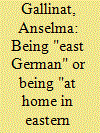

|
|
|
|
|
| Publication |
2008.
|
| Summary/Abstract |
An apparent resurgence of East German identity aroused much scholarly interest in recent years whilst it is contested in the German public discourse. Scholars see the phenomenon as based in experiences of domination and cultural devaluation; German scholars focus on East-West German differences, and the public discourse refers to the continuation of the "[Berlin] Wall in people's minds." When conducting field research in Saxony-Anhalt in 2001, I found, however, that my informants would consciously and carefully negotiate their senses of belonging. Many avoided claims to an exclusive identity category and instead emphasised more local senses of attachment which nevertheless encompassed the whole of eastern Germany. This article seeks to highlight the interplay of these two kinds of belonging. Its central argument is that they are two aspects of the same phenomenon. The article therefore explores how identity is based in the mundane and quotidian forms of everyday life leading to senses of belonging that allow for a reflexive positioning of the self and the other. This belonging is at certain times also voiced explicitly. The article also explores how and when identity rhetoric comes into play.
|
|
|
|
|
|
|
|
|
|
|
|
|
|
|
|
| 6 |
ID:
173695
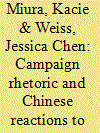

|
|
|
|
|
| Summary/Abstract |
Although China tends to be an important topic in election campaigns, the consequences of this rhetoric have not been systematically examined. We highlight the process by which China uses campaign rhetoric to make inferences about the intentions of new leaders in the US, Taiwan, and Japan. We identify two key criteria – consistency and change – that guide Chinese assessments. In turn, three patterns define Chinese policy toward new administrations: proactive engagement when campaign rhetoric is consistent with other indicators of policy change; reactive engagement when rhetoric is consistent with continuity; and a wait and see approach when rhetoric is inconsistent with the candidate’s past actions and the reputation of close advisors. Our findings push back against arguments linking leadership transitions to international conflict. Rather than testing the resolve of new leaders with military probes, foreign states can use information overheard during elections to gauge their counterparts’ intentions and ensure stability immediately after elections.
|
|
|
|
|
|
|
|
|
|
|
|
|
|
|
|
| 7 |
ID:
132533


|
|
|
|
|
| Publication |
2014.
|
| Summary/Abstract |
The rapid manner in which social protection systems have gained prominence and political support in development and poverty reduction discourse over the past few years is practically without precedent, leading some to consider it "a quiet revolution." Latin American countries have been at the forefront of this "revolution," with political support for government-funded social protection mechanisms going hand in hand with a growing discourse in favor of a human rights approach in development agendas. This approach is in line with the constitutions of most Latin American countries (including Argentina, Bolivia, Ecuador, Colombia, Guatemala, and Brazil), which enshrine a long list of human rights and explicitly recognize that these norms impose limits on state power. This constitutional protection of rights includes not only civil and political rights, but a wide range of economic, social, and cultural rights (see e.g. the constitutions of Colombia, Brazil, and Costa Rica), the prohibition of discrimination (on the grounds of gender, age, ethnicity, disability, sexual orientation, health status, and others), and the obligation to take affirmative action to protect groups that have suffered from structural discrimination (see e.g. constitution of Ecuador).
|
|
|
|
|
|
|
|
|
|
|
|
|
|
|
|
| 8 |
ID:
143554
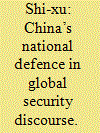

|
|
|
|
|
| Summary/Abstract |
China’s ascendancy in general and its military growth in particular have engendered mixed reactions the world over. This article takes up international academic discourse on China’s national defence and examines the ways in which recurring themes of China as a ‘regional threat’, ‘hostile East Asian power’, and as ‘untrustworthy’, as well as proposals of counter-strategies, are constructed in a case of an international journal publication. Proceeding from Cultural Discourse Studies (CDS), and especially the notion of rhetoric as morally oriented, the article shows that the ‘dangers’, ‘threats’ and ‘untrustworthiness’ of China are born, not out of presentations of facts or evidence, but out of particular rhetorical renderings of Western binary thinking and presumptions of ‘USA-as-guarantor-of-world-peace’ and ‘power-as-hegemony’. Further, it critiques from a CDS perspective the cultural bias and human consequences of these ways of thinking and speaking. The article ends with suggestions for culturally new ways of thinking and talking about the cultural Other and international relations more generally.
|
|
|
|
|
|
|
|
|
|
|
|
|
|
|
|
| 9 |
ID:
139827
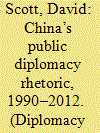

|
|
|
|
|
| Summary/Abstract |
During Hu Jintao’s period of leadership, careful public diplomacy language was deployed by the People’s Republic of China from 2000–2012 to describe the international system and China’s role within it. The terms looked at in this analysis are those introduced in the 2000s to recalibrate the ‘multi-polarity’ [shijie duojihua] emphasis of the 1990s. These terms have been deployed within a general ‘reassurance diplomacy’ that emphasised concepts like ‘responsible Great Power’ [fuzeren da guo], ‘multi-lateralism’ [duobian zhuyi], ‘good neighbourhood policy’ [mulin zhengce], ‘democratisation of international relations’ [guoji guanxi mingzhuhua], ‘peaceful rise’ [heping jueqi], ‘peaceful development’ [heping fazhan] and ‘harmonious world’ [hexie shijie]. Ambiguities, implications, impact, and tensions surrounding these terms are considered, and China’s deliberate adjustments pinpointed. China’s soft power intentions emerge from its instrumentalist use of diplomatic rhetoric, though a credibility gap also emerged between actions and words by 2012.
|
|
|
|
|
|
|
|
|
|
|
|
|
|
|
|
| 10 |
ID:
178804
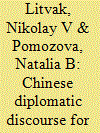

|
|
|
|
|
| Summary/Abstract |
New means of information warfare are now used to achieve new goals,
namely, cultural dominance and, as a result, control of other states and
peoples. In this respect, more and more attention has recently been paid
to the changing content and form of public communications by Chinese
politicians, including diplomats. The article studies the speeches of Chinese
ambassadors in key European countries (Germany, France, Great Britain, and
Italy) on two issues for which Chinese policy has lately drawn most of the Western criticism: the situation in Hong Kong and the COVID-19 pandemic.
To determine the dynamics of the diplomatic discourse, speeches made
between 2013 and mid-2020 were selected for analysis. The study is novel
in that it tests the comprehensive analysis methodology, in particular Michel
Foucault’s concept of discourse in combination with Jacques Derrida’s
concept of deconstruction. The analysis made points to the change in the
style of the Chinese diplomats’ communication towards its “mediatization,”
preference to appeal directly to the European media and general public,
doing so skillfully and with scientific substantiation.
|
|
|
|
|
|
|
|
|
|
|
|
|
|
|
|
| 11 |
ID:
101376
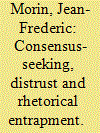

|
|
|
|
|
| Publication |
2010.
|
| Summary/Abstract |
While the WTO secretariat, key delegations, several NGOs, and industry publicly present the 30 August 2003 WTO Decision as an attempt to reconcile intellectual property with access to medicines, our research shows otherwise. We draw on qualitative analyses of 54 interviews and a lexicometric analysis of press releases to show that their enthusiastic public statements contrast deeply with their internal, cynical beliefs. Most of these actors not only consider the WTO Decision to be fundamentally flawed but claim to have known this prior to its adoption. We argue that a procedural norm of consensus-seeking impeded traditional bargaining over this sensitive issue and that distrust among participants hindered truth-seeking deliberation. Caught between strategic and communicative actions, state and non-state actors found themselves trapped in their own rhetoric of reconciling intellectual property with access to medicines. They realized that the appearance of a solution, rather than a functional solution, provided the only realistic outcome to a fruitless and publicly damaging continuation of debate. From a theoretical perspective, this case study sheds a new light on the gray zone between rational choice theory and constructivism, where both discourse and strategies matter. From an empirical perspective, it illustrates the risk of seeking consensus within international regimes when the procedural norm of consensus coexists with a high level of distrust.
|
|
|
|
|
|
|
|
|
|
|
|
|
|
|
|
| 12 |
ID:
092157
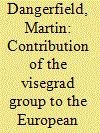

|
|
|
|
|
| Publication |
2009.
|
| Summary/Abstract |
The European Neighbourhood Policy (ENP), launched by the EU in May 2004 as the framework for relations with new Eastern neighbours, looked inadequate before it had even got off the ground. The ENP fell well short of what the Ukrainian 'Orange' politicians expected, was rejected by Russia and also faced a well of criticism from inside the EU.
|
|
|
|
|
|
|
|
|
|
|
|
|
|
|
|
| 13 |
ID:
089201
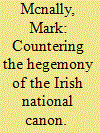

|
|
|
|
|
| Publication |
2009.
|
| Summary/Abstract |
The telling and re-telling of national history has long been recognised in studies of nationalism as one of its key legitimising and mobilising strategies. In this article I illustrate how a rhetorical approach can effectively explore this dynamic and emotive dimension of nationalist ideology by examining the rhetorical strategies in the Irish liberal intellectual, Seán O'Faoláin's, attempts to reconstitute the popular canon of Irish history in the 1930s and 1940s. More specifically, I show that contrary to depictions of O'Faoláin as a European liberal who employed rational argument to undermine and encourage the rejection of Irish nationalism and its emphasis on rhetorical narratives of the past, O'Faoláin's challenge to the Irish national canon reveals that he himself mobilised historical narrative to promote his own modernist version of Irish liberal nationalism and demonstrated in the process that he was one of the most skilful rhetors of his day.
|
|
|
|
|
|
|
|
|
|
|
|
|
|
|
|
| 14 |
ID:
114830
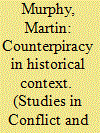

|
|
|
|
|
| Publication |
2012.
|
| Summary/Abstract |
This article identifies the salient lessons from three specific periods-the Graeco-Roman, Atlantic piracy and its extension into the Indian Ocean during the early Seventeenth Century, and piracy off China during the Ch'ing dynasty-that can most usefully inform the counter-piracy effort off Somalia. It makes the point that piracy's sinuous character has always given rise to conceptual and definitional difficulties; but that while law has had an important voice in piracy matters since Roman times it has never been the only voice. It suggests that modern pirate hunters, by treating piracy as akin to a domestic criminal activity, have shackled the effectiveness of violent suppression which their historical predecessors found so useful, while at the same time undervaluing the fundamental roles of politics and economics in piracy formation and the continuous struggle to make the seas safe for legitimate commerce.
|
|
|
|
|
|
|
|
|
|
|
|
|
|
|
|
| 15 |
ID:
098877
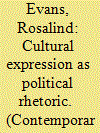

|
|
|
|
|
| Publication |
2010.
|
| Summary/Abstract |
This article explores the experiences of young Bhutanese refugees growing up in long-term camps in eastern Nepal. It focuses on a period of political crisis in the camps in 2006-2007, when community members' opinions clashed over long-term solutions to the refugee situation. The article examines the use of cultural expression - song, poetry, dance, art and drama - as a form of political rhetoric employed to inspire collective action for social change. These methods are used both by international agencies engaging children in community-based advocacy for improved children's rights and by revolutionary political groups building support for armed struggle to enable the refugees' return to Bhutan. The article considers how various actors use cultural expression to transform individuals' consciousness and build collective identities, and questions to what political ends these identities are put.
|
|
|
|
|
|
|
|
|
|
|
|
|
|
|
|
| 16 |
ID:
098879
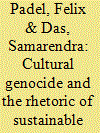

|
|
|
|
|
| Publication |
2010.
|
| Summary/Abstract |
In mining projects and metal factories proliferating in tribal areas of eastern central India, a gross disparity is evident between the dispossession and violence experienced by tribal communities on the one hand, and the rhetoric of 'sustainable development' put out by mining companies through public relations companies and the media on the other. While a large section of India's middle classes accept and identify with this rhetoric, grassroots movements of resistance to industrial displacement are gathering strength. 'Sustainable mining' is a concept promoted by mining companies through the International Council on Mining and Metals through its Mining, Minerals and Sustainable Development report. Yet long-term sustainability is the essence of the tribal communities being dispossessed of their land and resources, and a 'reality gap' exists between the rhetoric of development and events on the ground. Poverty is increasing, and 'cultural genocide' is a fitting description of the displacement process experienced by hundreds of tribal communities, while the war against the Maoists is in many ways a classic 'resource war'.
|
|
|
|
|
|
|
|
|
|
|
|
|
|
|
|
| 17 |
ID:
112380


|
|
|
|
|
| Publication |
2012.
|
| Summary/Abstract |
This article focuses on a specific aspect of Yu Hua's satiric criticism of Mao-era rhetoric through the use of double-voiced discourse in his full-length novel Cries in the Drizzle. I analyse how this double-voiced discourse is achieved through the contrast between the focalizers' unreflective and matter-of-fact use of Maoist rhetoric and the public narrator's clear awareness of the shabby realities behind this rhetoric. The varied understandings of Maoist rhetoric within a variety of narrative voices give rise to sarcasm, irony, and parody. Four episodes in Cries in the Drizzle will be analysed in detail. In each of these, Mao-era rhetoric is projected and embedded in the daily conversations and language of some characters who hail from villages in the countryside. These episodes invite readers to reflect upon just how much of the daily discourse of the Chinese people alludes to, or incorporates, the words of Mao and the Party, and also to appreciate the varied forms of double-voiced discourse brought about by differentiated perspectives of the public narrator versus the focalizers in Yu Hua's story.
|
|
|
|
|
|
|
|
|
|
|
|
|
|
|
|
| 18 |
ID:
184758


|
|
|
|
|
| Summary/Abstract |
This paper examines speechmaking on a contentious policy by arguably one of the most controversial figures to have assumed the Philippine presidency. Drawing on quantitative textual approaches on a corpus of 845 presidential speeches delivered between June 2016 and July 2020, we provide evidence that Rodrigo Duterte's evocative utterances against drug lords and criminals are not just deliberate illocutionary acts intended to court public support, but also priming tactics aimed towards a politically and economically significant audience whose acquiescence gives symbolic legitimacy to a controversial anti-crime policy. Using quantitative textual approaches and econometric analysis, we find that violent-crime rhetoric is more likely to accompany public pronouncements made before a political audience consisting of law enforcement authorities and government officials, as well as an economic audience made up of business chambers, overseas Filipino workers, and labor groups. Overall, the findings nuance an image of Duterte beyond that of a penal populist.
|
|
|
|
|
|
|
|
|
|
|
|
|
|
|
|
| 19 |
ID:
101842
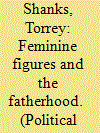

|
|
|
|
|
| Publication |
2011.
|
| Summary/Abstract |
Traditionally neglected, Locke's First Treatise of Government has taken on new significance with feminist interpretations that recognize the importance of its sustained engagement with patriarchal power. Yet feminist interpreters, both critics and admirers alike, read Locke as a champion of the "man of reason," a figure seemingly immune to the influences of passions, imagination, and rhetoric. These interpreters wrongly overlook Locke's extended engagement with the power of rhetoric in the First Treatise, an engagement that troubles the clear opposition of masculine reason and its feminine exclusions. Taking Locke's rhetoric seriously, I argue, makes the First Treatise newly important for what it shows us about Locke's practice of political critique. In following the varied and novel effects of Locke's feminine figures, we find a practice of political critique that depends on a mutually constitutive relation between rhetoric and reason.
|
|
|
|
|
|
|
|
|
|
|
|
|
|
|
|
| 20 |
ID:
187377
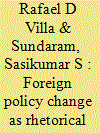

|
|
|
|
|
| Summary/Abstract |
Although the recent advancements in critical constructivist IR on political rhetoric has greatly improved our understanding of linguistic mechanisms of political action, we need a sharp understanding of how rhetoric explains foreign policy change. Here we conceptualize a link between rhetoric and foreign policy change by foregrounding distinct dynamics at the regional and domestic institutional environments. Analytically, at the regional level, we suggest examining whether norms of foreign policy engagement are explicitly coded in treaties and agreements or implicit in conventions and practices of actors. And at the domestic level, we suggest examining whether a particular foreign policy issue area is concurrent or contested among interlocutors. In this constellation, we clarify how four different rhetorical strategies underwrites foreign policy change – persuasion, mediation, explication and reconstruction – how it operates, and the processes through which it unfolds in relation to multiple audiences. Our principal argument is that grand foreign policy change requires continuous rhetorical deployments with varieties of politics to preserve and stabilize the boundaries in the ongoing fluid relations of states. We illustrate our argument with an analysis of Brazil’s South-South grand strategy under the Lula administration and contrast it against the rhetoric of subsequent administrations. Our study has implications for advancing critical foreign policy analysis on foreign policy change and generally for exploring new ways of studying foreign policies of nonwestern postcolonial states in international relations.
|
|
|
|
|
|
|
|
|
|
|
|
|
|
|
|
|
|
|
|
|